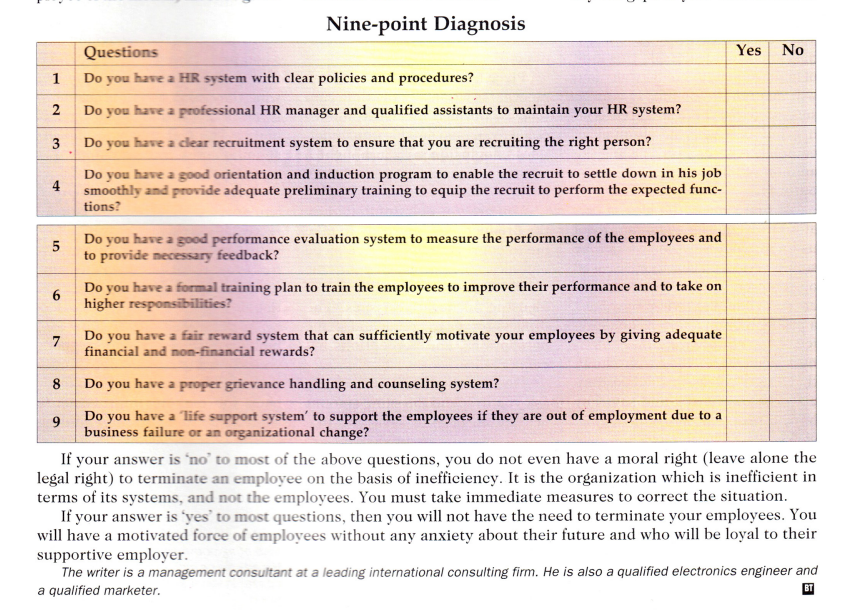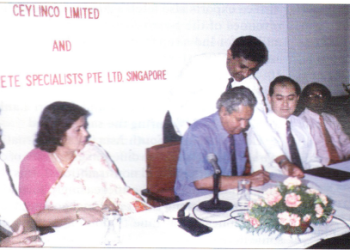S Arunasalam
There is a growing sense of frustration among the managerial staff in many companies about the termination provisions in the Sri Lankan labor laws. The Sri Lankan laws, in essence, allow termination by employers only on the grounds of proven misconduct. Termination on any other grounds will require permission from the authorities or will be generally viewed as unlawful. The managers, very often pressurized by their superiors for improved results, often feel that if they can get rid of some employees whose performance is not satisfactory, and replace them with some super performers, the overall performance will dramatically improve. But more often, they find that the super performers they recruited also do not deliver expected results and so they think of getting rid of these super performers and recruit super-super performers. As a result, sometimes these managers are replaced!
Stephen Covey said that if you put a good person into a bad system you get bad performance. It is a simple but profound statement that every manager should meditate on.
It is not surprising that very few companies in Sri Lanka have professional human resource (HR) managers. In many companies, it is either the CEO or the finance head who handles the HR function. Most often, they do not possess the required skills to do the job. As a result, the much needed formal HR system never finds its way into these companies.
Policies and methods
An organization must have clear HR strategies and policies. The HR strategies and policies must flow from clear business vision and strategies of the organization. There might be instances where the companies want to terminate employees (as their skills are no more needed) due to wavering business strategies.
Along with clear policies, the organizations should have effective methods to implement these policies.
Recruitment
There must be a clear recruitment policy addressing the need for recruitment and requirements of recruits. This would include job analyses, job descriptions and job specifications. Modern tools of recruitment such as psychometric assessment may also be used. The immediate supervisor, HRD professionals and even the CEO must be satisfied with the successful candidate so that nobody is made uncountable at a later stage.
One CEO, during a discussion, mentioned that he was not satisfied with the performance of one of his junior accounting personnel. He said that his expectations were very high when he interviewed this employee. He believed that this employee could handle much more responsibility than what was required for that position.
When probed further, the CEO came out with more facts. The recruitment process included a few phone calls to the CEO’s personal and social contacts who sent three or four candidates and a fifteen minutes interview with each of the candidates. In the absence of proper recruitment procedures, isn’t the CEO responsible for this situation? Further, the remuneration paid to this person was below market figures, and the CEO said that he thought it was a bargain. Haven’t you heard a saying, “if you give peanuts, you get monkeys?”
Training
There should be a clearly defined training policy for each position in the organization. Identification of training needs for each individual is equally important as the training itself.
Training should start from day one and the employee should never be thrown into darkness in his initial days of work. The confidence that the employee builds up during the first few days will take him throughout his stay in the company. But if the employee is thrown into deep water he will probably be learning for a very long time or even be drowned.
Feedback is an essential and integral part of on-the-job training.” However, many managers do not give adequate feedback to their new subordinates. Either, they do not attach any importance to it or, they do not possess the courage to give the right feedback.
Formal evaluation must be carried out periodically. As far as possible, the evaluation must be base on facts. Facts are generally seen and understood by all. Any subjective assessment should be made only to help an employee or to encourage him/her. Subjective assessments should be avoided if it could lead to denial of rewards or any prizing actions. A clear and objective evaluation mechanism must be evolved based on a performance agreement reached earlier. During performance evaluation, a manager should have courage and empathy courage to tell what he/she wants to tell (without beating around the bush) and to accept if any part of his/her evaluation is proved wrong, and empathy to understand the employee’s concerns.
Rewards
There must be a fair rewarding system. The monetary rewards and perquisites must sufficiently satisfy the social needs, while the recognition related rewards (such as employee of the month) must be given without demoralizing the others. Objectivity and impartiality are the keys to success. Dissipation takes place when bias is perceived. Re- wards should ideally flow from the performance agreement and the consequent appraisals. However, in today’s context, denial of rewards should never threaten employees’ security and basic living needs.
Grievance handling and Counseling
There should be a formal grievance handling and counseling system in the organization. Much of the energy of the employees is dissipated and wasted in worrying unnecessarily. It affects their performance and in the long run their mental health. If the organization can allay the fears and worries of its employees, it can benefit from the high creativity and efficiency of its employees. It should be noted that stress is the single largest cause for recorded deaths worldwide.
Disciplinary Procedures
Though disciplinary action is not always favored by employees, we often hear people complaining that there is no discipline in the organization. It is essential to build in disciplinary measures to avoid unpleasant and unlawful acts. Lack of discipline will affect the morale of good employees and create more indiscipline in the organization. Again, there should be clear and objective procedures.
In the absence of a proper social security system in Sri Lanka, a ‘hiring and firing’ culture will create severe social imbalances in the society. It is for this reason that the legal safeguards are still essential.
In this context, organizations will have to be more responsible in their recruitment and other HR- related functions. The check list given below, although not very comprehensive, may help you iden- tify the gaps in your HR functions.





